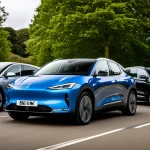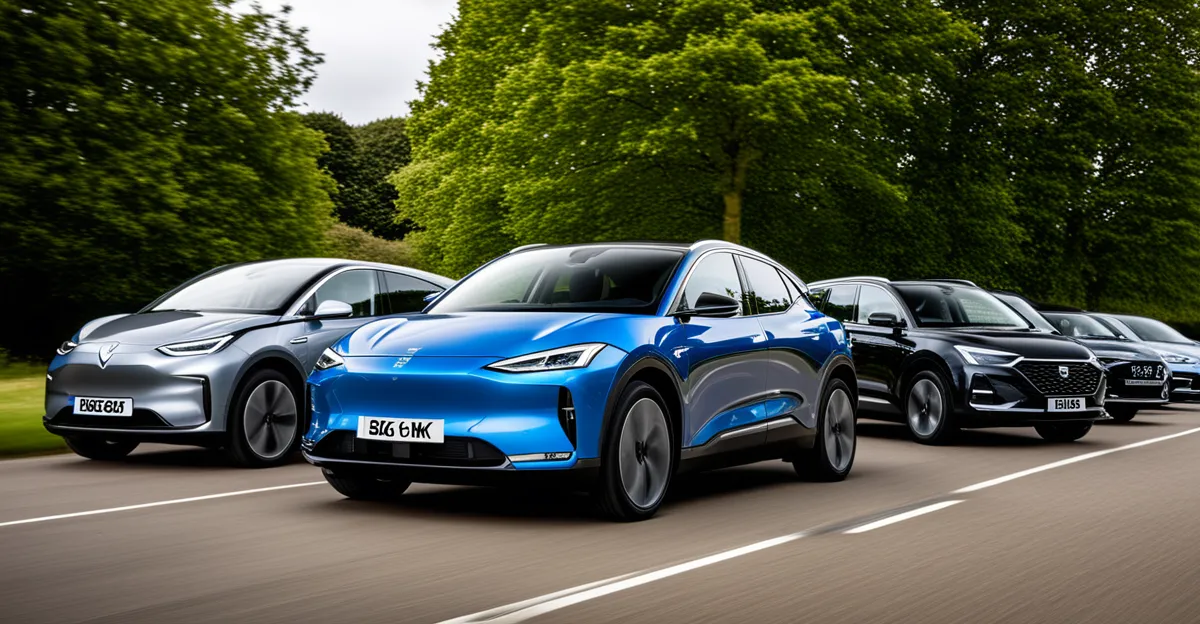Overview of Electric Vehicle Growth in the UK
Electric vehicle market UK continues to experience rapid expansion, fueled by increasing consumer interest and supportive policies. EV adoption UK has grown significantly, with electric car statistics UK showing a surge in registrations. In recent years, year-on-year growth trends in EV registrations have consistently outpaced traditional vehicle sales.
By 2023, electric vehicles accounted for over 15% of new car sales in the UK, a notable rise from just a few percent five years prior. This reflects a shift in consumer preference toward cleaner alternatives and increased affordability of electric models. Traditional vehicle market share has declined as a result, signaling a clear transition in the automotive landscape.
Also to read : How Can Electric Cars Transform the Future of the UK Automotive Industry?
The electric vehicle market UK benefits from improving battery technology and greater model availability, which have addressed many earlier barriers to ownership. These factors combine to accelerate EV adoption UK, making electric cars more practical and desirable. Continued growth in electric car statistics UK demonstrates how the sector is maturing rapidly, establishing EVs as a significant presence in the UK’s transport system.
Government Incentives and Regulatory Framework
Small steps lead to giant leaps in adoption.
Also to discover : How Will Automation Transform the Role of Mechanics in the UK’s Automotive Sector?
The UK government EV incentives play a pivotal role in accelerating EV adoption UK. Key national schemes include grants for new electric vehicles, reductions in vehicle taxes, and subsidies for home charging installations. For example, the Plug-in Car Grant offers significant financial relief for buyers of eligible electric cars, making EV ownership more accessible. Together, these incentives reduce upfront costs and boost consumer appeal.
Electric vehicle policy UK is grounded in ambitious regulatory targets focused on achieving zero-emission transportation. The government has mandated a ban on new petrol and diesel car sales by 2030, with further restrictions targeting hybrids by 2035. These rules create strong market signals encouraging both consumers and manufacturers to prioritize clean vehicles.
How does policy impact consumer behaviour and automaker strategies? Evidence shows that clearer regulations and financial support have increased EV registrations dramatically, reflecting the yearly growth trends in EV adoption UK. Automakers, responding to zero-emission regulations, are investing heavily in electric vehicle research and production to meet future demand. This combination of incentives and regulations is essential in steering the UK electric vehicle market toward sustainability and rapid transformation.
Leading Manufacturers and Electric Vehicle Models
The electric vehicle manufacturers UK landscape features both established automakers and innovative newcomers driving the market forward. UK and global EV industry leaders UK such as Nissan, Tesla, and Jaguar Land Rover are pivotal, each pursuing aggressive electrification strategies to capture growing demand. Nissan’s Leaf remains a popular choice among British consumers due to its reliability and affordability, making it one of the top EV models UK. Similarly, Tesla’s Model 3 and Model Y offer strong performance and range, appealing to buyers seeking advanced technology and long-distance capability.
Jaguar Land Rover’s push with the I-Pace highlights the growing presence of luxury electric SUVs in the market. Other manufacturers, including BMW and Hyundai, have expanded their electric lineups, catering to diverse segments and budgets. Investment in research and development is substantial, with focus on improving battery efficiency, charging speeds, and vehicle design to meet evolving UK consumer needs.
Innovation within the sector is vital, as competition intensifies alongside rising EV adoption UK. With popular electric vehicle models UK continuously evolving, automakers are working to balance affordability, choice, and performance, ensuring their offerings remain competitive while addressing environmental goals. This momentum signals a robust and dynamic future for the UK’s EV industry.
Electric Vehicle Charging Infrastructure Expansion
As the electric vehicle market UK grows, expanding the EV charging stations UK network becomes crucial to sustain rising demand. In recent years, the UK charging network has seen significant investment from both government initiatives and private companies aiming to enhance accessibility and convenience. The establishment of fast chargers and widespread public EV infrastructure supports the surge in EV adoption UK, addressing a core concern: charging availability.
Current infrastructure includes a mix of rapid chargers located along highways and slow chargers in urban areas. Despite progress, disparities persist, with urban regions benefiting from denser networks while rural areas experience slower expansion. This urban-rural divide influences consumer confidence in EVs, as public EV infrastructure is vital for longer journeys and everyday use beyond private home chargers.
Government funding schemes complement private investments, promoting installation of chargers in workplaces, retail centers, and residential streets. With ongoing enhancements, the UK charging network aims to keep pace with year-on-year growth in electric car statistics UK, facilitating smoother transitions to electric driving nationwide.
By addressing geographical gaps and increasing charger reliability, the infrastructure expansion is foundational to maintaining the trajectory of EV adoption UK and ensuring that the electric vehicle market UK can continue growing sustainably.
Challenges Facing the UK EV Market
The UK EV challenges mainly stem from issues like range anxiety and battery technology limitations. Many consumers worry about the driving range of electric cars, fearing they won’t travel far enough before needing a recharge. While battery improvements are ongoing, current capacities and charging times still cause hesitation among potential buyers. This concern remains a significant electric car barrier UK, affecting decision-making despite growing EV adoption UK.
Consumer perceptions play a vital role too. Some remain skeptical about the total cost of ownership or the reliability of electric vehicles, which may slow adoption despite supportive government incentives and expanding infrastructure. Additionally, supply chain disruptions and resource availability affect production. The UK automotive market issues include shortages of critical materials like lithium and cobalt, essential for battery manufacturing.
Addressing these challenges requires continued innovation in battery technology, increased public education, and stable supply chains to meet demand. Overcoming these barriers is crucial for sustaining momentum in the electric vehicle market UK, ensuring that perceptions align with the tangible benefits shown in electric car statistics UK and encouraging wider acceptance across diverse consumer groups.
Economic and Environmental Considerations
The economic impact EV UK is increasingly positive as adoption grows. Electric vehicles offer lower operating costs compared to petrol and diesel cars, mainly due to reduced fuel and maintenance expenses. This makes EV ownership economically attractive over time, supporting the rise in electric car statistics UK. The cost of ownership electric vehicles UK continues to improve as battery prices decline and incentives remain in place, enabling more consumers to benefit financially.
From an environmental perspective, the benefits of EVs are significant. Widespread EV adoption contributes to reductions in greenhouse gas emissions and air pollution, aligning with the UK’s commitment to climate targets. The environmental benefits EV include lower carbon footprints per mile, especially as the UK grid becomes greener with more renewable energy sources. These advantages support government goals and drive consumer interest in cleaner transportation alternatives.
Together, the economic and environmental factors create a compelling case for continued EV adoption UK. As costs decrease and awareness of ecological impact rises, electric vehicles offer a sustainable solution that benefits both consumers’ finances and the planet. This dual benefit strengthens the UK’s position as a leader in the electric vehicle market UK, encouraging broader acceptance and faster market transformation.



